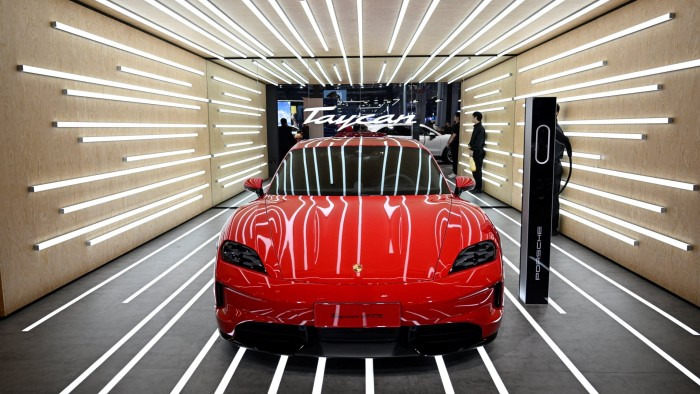Unlock the Editor’s Digest for free
Roula Khalaf, Editor of the FT, selects her favourite stories in this weekly newsletter.
Profits at Porsche and Volvo Cars fell sharply in the first quarter as the two carmakers warned of the toll on the industry from Donald Trump’s trade war.
Geely-owned Volvo Cars withdrew its guidance for the next two years while Porsche forecast that its 2025 profit margins would fall to “a historically low level” as companies rush to cut costs and protect cash flow in response to US tariffs.
The administration imposed a 25 per cent levy on foreign-made cars imported from early April, with some exemptions for Mexico and Canada. A separate 25 per cent tariff on auto parts is due to take effect from May 3.
Trump is planning to spare carmakers from some of his levies, such as those on steel and aluminium, after intense industry lobbying. But uncertainty about the final tariff levels has made it difficult for companies to calculate the costs.
“This year will be a very challenging and turbulent year,” said Håkan Samuelsson, who returned as chief executive of Volvo Cars this month. “We need to further protect our cash flow generation and lower our fixed costs.”
Volvo Cars shares fell 10 per cent on Tuesday after it reported a 59 per cent fall in first-quarter operating profits, from SKr4.7bn ($488mn) a year ago to SKr1.9bn. That was far less than the SKr2.7bn analysts had expected, according to S&P Capital IQ. It has also launched a SKr18bn cost-cutting programme that will involve a reduction in administrative roles and supplier costs.
In February, it warned profits and volumes would be lower this year, and said it would aim for a core operating profit margin of 7 per cent to 8 per cent in 2026. Forecasts for 2025 and 2026 were withdrawn on Tuesday.
The carmaker has said it wants to increase production at its factory in South Carolina and hopes the US will adjust its policy to allow it to offset import tariffs if it is also exporting vehicles from the country.
“[The policy] is moving every day, but . . . it’s in their own interest to promote exports from their factory,” Samuelsson said.
Separately on Tuesday, Porsche said its group operating profit slumped 40 per cent in the first quarter to €762mn, compared with €1.28bn in the same period last year, because of tariffs, costs associated with its move away from focusing on electric vehicles and a decline in deliveries.
Chief financial officer Jochen Breckner said the company expected the environment to “remain challenging”, adding: “We can’t completely escape this, but we are doing everything within our power to counteract it.”
The luxury-car maker is particularly exposed to US tariffs because it makes all its cars in Germany. Its sales in China, another important market, have also been falling.
Porsche on Monday said it expected its full-year return on sales margin to be from 6.5 per cent to 8.5 per cent, compared with previous guidance of 10 per cent to 12 per cent.
Its second guidance cut in two months reflected “negative impacts” from US tariffs for April and May, the company said. Its shares fell 5 per cent in early trading on Tuesday morning but recovered most of these initial losses.
Porsche said its decision not to expand production at its battery maker Cellforce because of slowing demand for its EVs, driven by a drop in China, would contribute to a rise in “special expenses” in 2025 from €800mn to €1.3bn.


